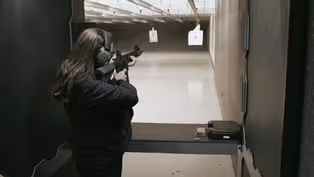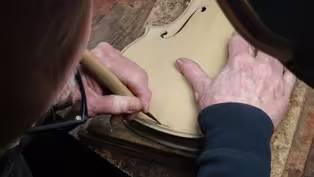
My Take: Jake Blount on Black Folk Music
Clip: Season 5 Episode 8 | 5m 51sVideo has Closed Captions
A musician sheds light on the captivating story of Black folk music.
Rhode Island has long been a haven for folk music. The Newport Folk Festival has featured icons from Bob Dylan to Joni Mitchell. But folk music has deep, often-forgotten roots in Black culture. Award-winning musician Jake Blount shares his take on the captivating story of Black folk music.
Problems playing video? | Closed Captioning Feedback
Problems playing video? | Closed Captioning Feedback
Rhode Island PBS Weekly is a local public television program presented by Ocean State Media

My Take: Jake Blount on Black Folk Music
Clip: Season 5 Episode 8 | 5m 51sVideo has Closed Captions
Rhode Island has long been a haven for folk music. The Newport Folk Festival has featured icons from Bob Dylan to Joni Mitchell. But folk music has deep, often-forgotten roots in Black culture. Award-winning musician Jake Blount shares his take on the captivating story of Black folk music.
Problems playing video? | Closed Captioning Feedback
How to Watch Rhode Island PBS Weekly
Rhode Island PBS Weekly is available to stream on pbs.org and the free PBS App, available on iPhone, Apple TV, Android TV, Android smartphones, Amazon Fire TV, Amazon Fire Tablet, Roku, Samsung Smart TV, and Vizio.
Providing Support for PBS.org
Learn Moreabout PBS online sponsorship(upbeat banjo music) (hands clapping) - My name is Jake Blount and this is my take on Black folk music.
(upbeat banjo music) Black Folk music is important, because it's the bedrock of every major American musical export.
If you don't have traditional Black folk music, you don't get blues, you don't get jazz, you don't get gospel, you don't get rock and roll, you don't get any of the things that came out of rock and roll.
You don't get punk, you don't get disco, you don't get house.
We have a spotty historical record when it comes to Black folk musicians and they're, our contribution to the canon.
And there's a lot of restoration of the historical narrative that we have to do.
♪ I am a poor old railroad man ♪ In the early 1900, we start to see white record executives go down into the South and they began to market white musicians from the South as hillbilly musicians.
They made hillbilly records and that is what we would generally consider early country music, early folk music, stuff in that vein.
And Black musicians were recorded making race records and those tended to be early blues in jazz.
♪ Way down in South in the Alabamy ♪ And that meant that these genres, which had been all together, fed into one another for so long, wound up splitting apart, because there was a financial incentive for them to do so.
And they split apart, not across sonic lines, but across race lines.
You had to make a certain type of music or else nobody would record you.
Nobody would sell your stuff, you wouldn't be able to play gigs.
There are some prominent white artists from hillbilly records back in the day whose work we know now who learned a lot of what they did from Black musicians.
One example would be the Carter family.
(mellow Hillbilly music) And A.P.
Carter, the father of that family, traveled around collecting songs with a disabled Black man named Lesley Riddle, who taught them a good deal of their repertoire, likely, heavily influenced, if not completely taught Mabel Carter her guitar style.
He never got recorded until decades later and you know, is playing some of the same music, but it gets categorized under blues and not country.
(upbeat violin music) I don't like the way that musicians, and marketing people and scholars have represented the Black folk tradition as this like dead thing that exists in the past.
I like to incorporate traditional repertoire in the things that I'm doing now.
(upbeat music) My new album is called "The New Faith".
It's an Afro-futurist concept album that explores what Black religious music might sound like in a post climate crisis world.
So it set a few hundred years in the future and uses music all the way from a few hundred years into the past.
♪ Once there was no sun ♪ ♪ Once there was no sun ♪ It feels like sitting down with somebody who I don't know and them sharing something that's really personal and there is a unifying feeling in that, that we're sharing something because we know it's important to pass on and we know it's important for the next person to have.
I don't know who I am without this music.
(upbeat violin music) For Black people, these songs are the oldest texts that we have.
They come out of a time and a place where people were legally not permitted to learn to read and write, much less encouraged to honestly convey their thoughts in a recorded medium.
The songs are the only thing that I have to tell me what my ancestors wanted from me and how I'm supposed to think about the world even as it exceeds the bounds of my influence.
(upbeat violin music) (hands clapping) My name is Jake Blount and this was my take on Black folk music.
Video has Closed Captions
Clip: S5 Ep8 | 12m 33s | The heated debate over an assault weapons ban renewed in the Rhode Island General Assembly (12m 33s)
Video has Closed Captions
Clip: S5 Ep8 | 8m 14s | Meet the Rhode Islander who left his job filing briefs for work fiddling with fine violins (8m 14s)
Providing Support for PBS.org
Learn Moreabout PBS online sponsorship
- News and Public Affairs

Top journalists deliver compelling original analysis of the hour's headlines.

- News and Public Affairs

FRONTLINE is investigative journalism that questions, explains and changes our world.












Support for PBS provided by:
Rhode Island PBS Weekly is a local public television program presented by Ocean State Media

